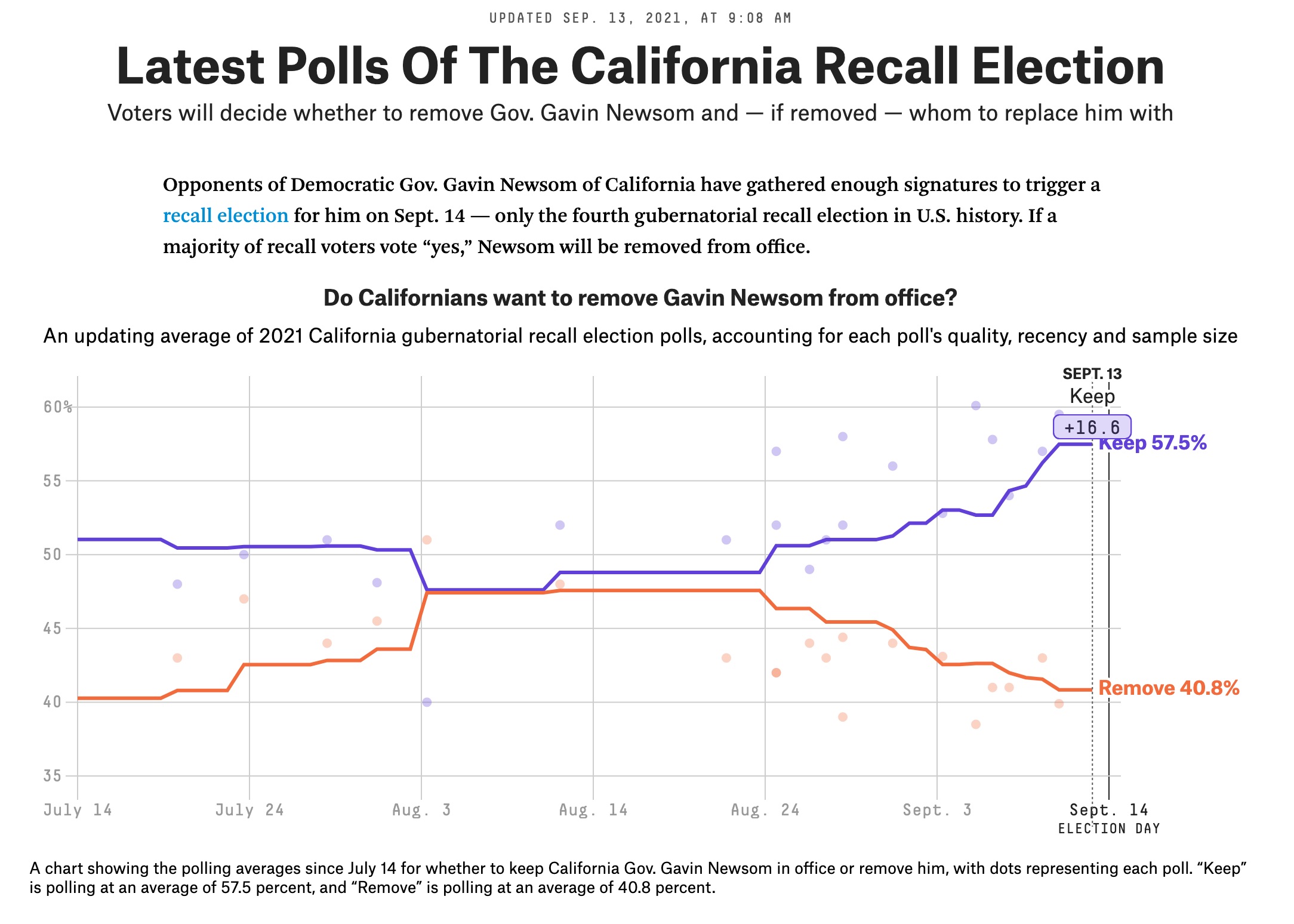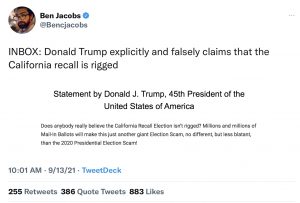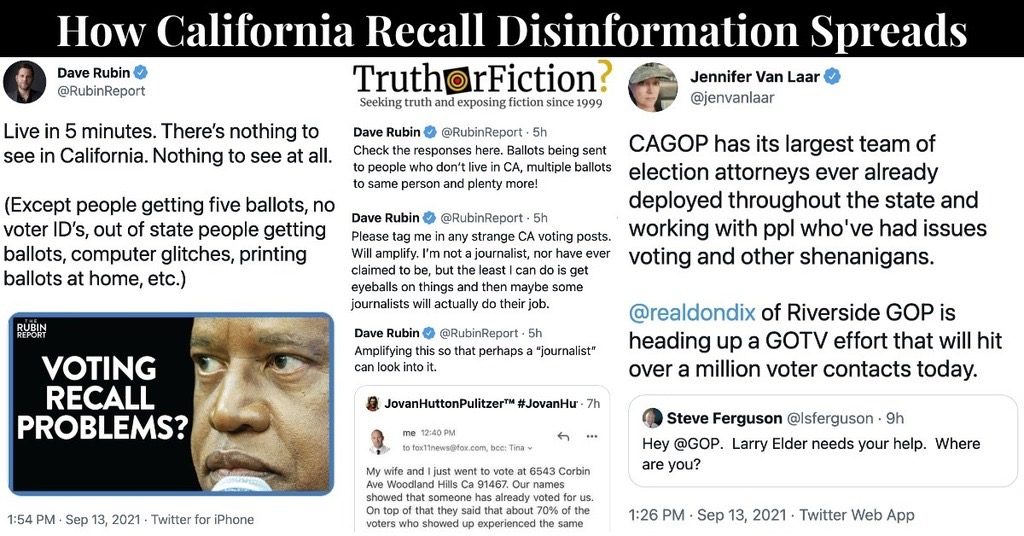In the lead up to the California gubernatorial recall election of September 14 2021, the usual disinformation purveyors went into high gear, poisoning the well with wall-to-wall claims of perfidy and election theft.
Overall, the California recall and its elements were far-reaching, so we have broken this page up into parts.
What’s the Deal with the Recall Election?
Although the election was slated for September 14 2021, discourse about it stretched back to at least April 2020, when “Recall Newsom” signs began to appear at anti-quarantine and anti-mask rallies. The recall campaign started to gain ground in the national mainstream in early 2021 — not coincidentally, within weeks of the Capitol insurrection.
On January 27 2021, California political news site CalMatters published, “Recalling a California governor, explained.” About three weeks after false claims of a “stolen election” led to the Capitol riots, CalMatters reported that pre-pandemic efforts to recall California governor Gavin Newsom initially floundered, but later gained steam during the chaotic events of 2021:
“Recall Gavin Newsom” signs are popping up around California [in January 2021]. At shopping centers and street protests, people fed up with the Democratic governor are asking voters to sign petitions. What began as a far-fetched effort by Republican activists has turned into a credible campaign attempting to throw Newsom out of office.
It’s hard to fathom in this deep blue state where Newsom clobbered his 2018 GOP opponent and, according to polls, remains popular with a strong majority of voters. But the coronavirus pandemic shifted California’s political landscape in two significant ways: It prompted a judge to give recall supporters more time to collect signatures — keeping their campaign alive long enough to gain momentum — and it led Newsom to enact a slew of new restrictions to curb the spread of the virus that have frustrated some Californians and energized recall backers.
The recall petition doesn’t say a word about the pandemic — it was written before the virus upended normal life. But it gained a surge of signatures after news broke in November [2020] that a maskless Newsom joined lobbyists for a dinner party at the posh French Laundry restaurant, even though he was telling Californians to mask up and avoid socializing. The count has grown as the state’s unemployment system paid out billions to fraudsters, and its chaotic COVID vaccine distribution has left people scrambling for shots. With many schools, churches and businesses closed by Newsom’s stay-at-home orders, the recall that began as a conservative rebuke of his progressive policies has morphed into a referendum on his pandemic response.
That reporting was constantly revised as efforts to recall Newsom intensified. On September 13 2021, the first few paragraphs were updated to incorporate events that took place in the interim:
Gov. Gavin Newsom is fighting for his political life. He’s working to fend off a recall that began as a far-fetched effort by Republican activists — but has turned into a credible campaign that could throw the Democrat out of office.
It’s hard to fathom in this deep blue state where Newsom clobbered his 2018 GOP opponent, although his job approval among voters plunged from its high in the early months of the pandemic. But the coronavirus pandemic shifted California’s political landscape in two significant ways: It prompted a judge to give recall supporters more time to collect signatures — keeping their campaign alive long enough to gain momentum — and it led Newsom to enact a slew of new restrictions to curb the spread of the virus that have frustrated some Californians and energized recall backers … The count grew as the state’s unemployment system paid out billions to fraudsters, and its chaotic COVID vaccine distribution left people scrambling for shots. As many schools, churches and businesses closed during Newsom’s stay-at-home orders, the recall that began as a conservative rebuke of his progressive policies morphed into a referendum on his pandemic response.
An explainer by the New York Times provided background on California’s recall elections, how common they were, how often they resulted in ousters, and why:
Direct democracy is a big part of Golden State political culture. Since 1911, when California approved recalls as part of a sweeping Progressive-era reform package, at least 179 recall attempts have been made against state officeholders. Launching a recall in California is easier than in almost any state, and every governor since 1960 has faced at least one.
But the vast majority of those efforts against governors fizzle. California is enormous, with a population of nearly 40 million and at least five major media markets. The cost of campaigning statewide tends to thwart all but the most moneyed and determined critics.
Besides Mr. Newsom’s, only one other attempted recall of a California governor, Gray Davis, has ever reached an election. Mr. Davis lost in 2003 to Arnold Schwarzenegger, who went on to face his own blitz of attempted recalls.
An explainer from NPR cited the “French Laundry incident” (as did CalMatters and the Times), which contrasted the September 14 2021 with the 2003 recall. NPR also described “Republican Larry Elder, a controversial talk radio host” as the leading replacement contender on the ballot:
How did Newsom end up in this position?
The recall effort began in June 2020 and didn’t have to do with COVID-19. As KQED’s Scott Shafer told the NPR Politics Podcast, it was about the death penalty, crime, homelessness, housing costs and immigration.
But it very much became about the pandemic after Newsom was caught on camera at a birthday party — without a mask — at one of the most expensive restaurants in America, The French Laundry, in November [2020]. It reeked of hypocrisy, given this was during the height of the pandemic and with restrictions in place in California.
[…]
Three major differences, though, between 2003 and this 2021 recall:
- This recall has been far more nationalized. Newsom has essentially put GOP governance on the ballot, especially the coronavirus pandemic, which is what ironically supercharged the effort to get the recall on the ballot in the first place.
- Unlike Davis, Newsom is fairly popular. His approval ratings are routinely above 50%.
- And Schwarzenegger was something that’s now seemingly an endangered species among elected officials: a Republican moderate. Elder is decidedly not. In addition to his controversial views, Elder has definitively said he would appoint a Republican to the U.S. Senate if Feinstein’s seat were to come open.
Polling Ahead of the Recall
NPR noted that Newsom remained fairly popular despite the recall effort and disinformation around it, a sentiment reflected in FiveThirtyEight.com’s live coverage of the California recall.
As of September 13 2021, Newsom was favored to remain in office, per the site’s polling aggregations:

What California Recall Rumors and Disinformation Look Like on Social Media
On September 13 2021, we asked readers to forward any rumors, disinformation, or general claims about the California recall.
Among initial responses we received were a whole plethora of claims by Dave Rubin (@RubinReport), a one-man band sowing doubt about the security of the recall in broad swaths. Rubin’s approach seemed to be uncritically spreading unverified and in some cases unverifiable rumors, contributing to ongoing firehosing efforts:
Rubin was courteous enough to save us the trouble of transcribing a portion of the constellation of rumors he spread and helped launder, tweeting in part:
There’s nothing to see in California. Nothing to see at all.
(Except people getting five ballots, no voter ID’s, out of state people getting ballots, computer glitches, printing ballots at home, etc.)
He also amplified a tweet suggesting that the security of September 14 2021 election was already in dispute:
Readers also linked to claims of pro-Newsom assaults, comments from Elder about “accepting” the outcome, a purported Instagram screengrab alleging voters learned they “already voted,” and assertions about Republicans being “turned away” from polling places:
Former President Donald Trump, a proponent of casting doubt on elections, weighed in:

Members of local law enforcement enthusiastically pushed the same baseless line.
Is There a Good Reason to Be Skeptical of the California Recall?
An old proverb, “where there’s smoke, there’s probably fire,” is paired on Google with the following explanation: “there’s always some reason for a rumor”; it’s fair to say that many people consider repeated allegations of wrongdoing to amount to “fire.”
On January 5 2021, one day before the Capitol was breached on false claims of a “stolen election,” Time.com examined the risks inherent in making such discussions mainstream and rote:
In normal times, the [counting of electoral votes] is defined by pomp and circumstance, a formality mandated by the Constitution. But this year [2021], President Trump has refused to concede, turning the ceremony into a loyalty test and effectively daring Republicans to defy him by acknowledging Biden’s legitimate victory. In a sign of Trump’s continuing grip on the party, many are heeding his call by announcing they will object to Biden’s win. Dozens of Congressional Republicans are using the joint session as a final attempt to undermine that most hallowed tradition of American democracy: the peaceful transition of power.
The ploy almost certainly won’t reverse the outcome of the race. Biden will still be sworn in as the next President of the United States on January 20 [2021]. But Trump’s reckless attempts to sow chaos—and Republicans’ willingness to abet it—have forced a reckoning within his party and revealed the vulnerability of Americans’ centuries-old democratic traditions.
[…]
Most of the Republicans who plan to challenge the outcome have said their intention is to air allegations of rampant voter fraud. But those claims are not supported by evidence. Trump’s own Administration deemed the election the most secure in U.S. history. And since Election Day, Trump’s legal team has lost nearly all of its challenges to election results in court, with judges widely rejecting their allegations.
That piece observed that “challenging the results [of a legitimate elections was] damaging to democracy.” A September 13 2021 Vanity Fair item (“Republicans Are Settling On A Strategy For Election Losses: It Was Rigged!”) bore the following subheading, alluding to a well-poisoning in progress:
In taking a page from Trump’s big lie playbook, some on the right are already baselessly suggesting a Gavin Newsom victory in the upcoming California recall would be the result of fraud.
It began by highlighting the difficulty of describing the efforts to erode confidence in elections:
It’s hard to say exactly when Donald Trump started lying about widespread fraud in the 2020 election because he’d never really stopped lying about it in the 2016 election. But if you had to pinpoint when his outlandish, self-serving conspiracy theories really began to accelerate, it was probably around the late spring of last year [2020], when polls indicated that he could lose to Joe Biden and that his desperate attempts to brand his opponent as a “sleepy” socialist didn’t seem to be working. As I asked in May 2020, “Is Trump Setting the Stage to Dismiss the 2020 Election Results?” Trump appeared to answer that question by the summer: “2020 will be the most INACCURATE & FRAUDULENT Election in history,” he wrote. “It will be a great embarrassment to the USA.”
That story observed that Newsom’s challenger Elder borrowed Trump’s rhetoric before voting even began, telling reporters in early September 2021 that there “might very well be shenanigans.”
The Vanity Fair piece continued, addressing the intent in firehosing fraud claims before, during, and after elections:
The idea here is pretty transparent: To erode confidence in the process to avoid confronting defeat and to justify attacks on the voting system. “This is baked into the playbook now,” as Michael Latner, an associate professor of political science at California Polytechnic Institute, told the New York Times. Like other MAGA moves now in the GOP playbook, this maneuver began as a Trump tick, based on his neurotic inability to accept ever being seen as a “loser,” but has since been adopted by more calculating operators. They may not believe, as Trump apparently does, that this kind of bellyaching will actually succeed in getting the results dismissed. But they are certainly aware that it lays the foundation for future election challenges, voter suppression laws, and other anti-democratic overtures … One of the frightening things about all this is how easily these lies go down, how little effort is required of the people selling these fictions to get the base to buy them.
Summary
Officially, the California recall election would occur on September 14 2021, though early voting was available to residents of the state. Disinformation purveyors were laser-focused on the looming election from its very beginning, seeding distrust by way of amplifying any and all rumors about glitches, errors, ballots, and polling places.
- CalMatters | About
- Recalling a California governor, explained
- Recalling a California governor, explained
- The California Recall, Untangled
- The California Recall And Its Very Real Political Consequences, Explained
- California Recall Election: Live Updates
- "Some crazy stuff happening with LA voting. At my polling place a staffer told one of my employees that the electronic machines don’t count votes, just register that you voted. The staff count themselves. Are there cameras? Any system to verify and match?" | @RubinReport/Twitter
- "Amplifying this so that perhaps a “journalist” can look into it." | @RubinReport/Twitter
- Firehosing (Disinformation) | TruthOrFiction.com
- "Please tag me in any strange CA voting posts. Will amplify. I’m not a journalist, nor have ever claimed to be, but the least I can do is get eyeballs on things and then maybe some journalists will actually do their job." | @RubinReport/Twitter
- "There’s nothing to see in California. Nothing to see at all. (Except people getting five ballots, no voter ID’s, out of state people getting ballots, computer glitches, printing ballots at home, etc.)" | @RubinReport/Twitter
- "CAGOP has its largest team of election attorneys ever already deployed throughout the state and working with ppl who've had issues voting and other shenanigans. @realdondix of Riverside GOP is heading up a GOTV effort that will hit over a million voter contacts today." | @jenvanlaar/Twitter
- "Thread: This “exclusive” is direct from the far-right propaganda site “The Gateway Pundit.” The story relies on one interview from a recall supporter who *did not* witness the assault. It cites another pro-recaller, not police or doctors, on the diagnosis of a fractured skull. twitter.com/abc7newsbayare…" | Twitter
- "CA recall GOP front-runner Larry Elder won’t commit to accepting the results of the election tomorrow." | @TheRecount/Twitter
- Just ahead of the recall election, LAPD Sgt. Gordon Helper is pushing a conspiracy theory that voting will be rigged.
- Trump Recall Election Statement
- Where there's smoke, there's fire
- Congressional Republicans Won't Overturn Biden's Win. But Their Objections Are Still Dangerous
- REPUBLICANS ARE SETTLING ON A STRATEGY FOR ELECTION LOSSES: IT WAS RIGGED!

